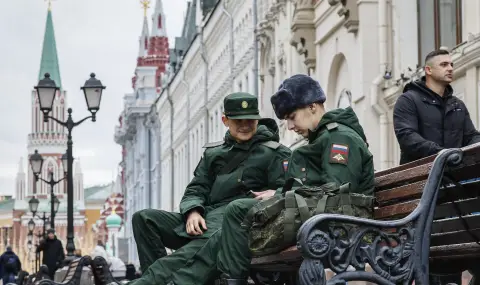We have not seen such a thing even at the end of the Soviet era, human rights activists claim . In Russia today, even minors who have expressed disagreement with the Russian invasion of Ukraine are subject to repression. Teenagers end up in educational colonies for a period of 2 to 6 years. And neither the youth's age stops the courts, nor the conflicting evidence of their guilt. So far, at least eight minors are known to have been imprisoned for their opinions on Russia's policy towards Ukraine.
The case with the students from Kansk
Before the invasion of Ukraine, the political regime in Russia was limited to "soft" repression of minor dissidents: fines were imposed for political dissent, and suspended sentences were the maximum punishment. Against this background, the case of the students from the city of Kansk in the Krasnoyarsk region is a real precedent.
In 2020, three students were detained there for pasting leaflets in support of Azat Miftakhov - an anarchist student accused of setting fire to the Moscow office of "United Russia". The teenagers pasted one of the leaflets to the FSB building in their city, and correspondence critical of Russian President Vladimir Putin was found on their phones, as well as alleged "evidence" for instructions on handling explosives. After all, it is this "evidence" were used to indict them.
Law enforcement agencies apparently gave special weight to the allegations despite their absurdity. So, for example, in the files of the teenagers initially as "evidence" for their fault, a plan to virtually blow up the FSB building is described - in the Minecraft game. Later, however, these details were removed from the indictment, so that it finally emerged that the teenagers were preparing to blow up the FSB building.
At the time of sentencing, two of the three defendants pleaded guilty to the illegal manufacture, possession and carrying of "real" explosives. The two students in question received suspended sentences. But 16-year-old Nikita Uvarov refused to admit such guilt and was sentenced to 5 years in an educational colony. "I have nothing to be ashamed of. I didn't intend to blow anyone up," the student said in his last word.
Criminal responsibility from the age of 14
DV is aware of at least 8 trials against minors whose criminal cases were based on politically motivated accusations. The most common charge is for "terrorism", for which criminal responsibility is borne at the age of 14. From this age, a person can be prosecuted, for example, on charges of murder, rape, participation in mass riots and other serious crimes.
So far, the youngest detainees are students from the city of Noyabrsk - 13-year-old Timur and 14-year-old Sasha. They were detained in September on suspicion of setting fire to an MI-8T helicopter. According to lawyer Yevgeny Smirnov, Russian law does not allow a 13-year-old child to be charged under any article of the Criminal Code, but the other student, who is already 14 years old, can be charged under any of the articles for "terrorism." ;. Such is the case with the 16-year-old students Anton and Roman from the city of Omsk, detained in September of this year for setting fire to a Mi-8 helicopter.
Certainly there are more such cases, but court cases are usually closed behind closed doors, and the parents of the accused often keep the trials from becoming public, explains lawyer Evgeny Smirnov.
"Some parents with pro-government views force their children to confess to the acts they are accused of," adds the lawyer. According to him, it is easiest for law enforcement agencies to go after minors: "There is nothing easier than to extract statements from children,", he says.
The maximum possible sentence for minors under articles of the anti-terrorist legislation is 10 years in a penal colony. So far, the defense has managed to reduce this maximum sentence, but even short terms can ruin the psyche and future of these children, emphasizes Smirnov.
The heaviest sentence known to the State Government was handed down against 17-year-old Yegor Balazeykin, who was sentenced to six years in prison for "attempting to commit a terrorist act". He is accused of two failed attempts to set fire to military recruitment centers, in which no one was injured. Balazeykin himself does not deny that he opposes the Russian actions in Ukraine and assures that the burning of the military recruitment centers was a form of protest.
15-year-old Arseniy Turbin was sentenced to 5 years in prison for distributing leaflets against Putin. The young man stated that he distributed the leaflets based on his personal beliefs.
The difference between a correctional facility and an adult prison
By 2023, Russia had a total of 13 educational colonies in which 842 minors were accommodated. The conditions in them are better than in a prison for adults, claims the human rights activist Lyudmila Alpern. Since 1999 until 2017 she regularly visits prisons for women and juveniles as a member of the Public Supervisory Commission in Moscow. Before this period, the situation with the educational colonies was catastrophic, she says and recalls that at that time, about 25,000 children were accommodated in 63 colonies throughout the country.
According to her, in the educational colonies people live in barracks, just like adults. Children are at least allowed to go for walks throughout the day in designated areas. There are also physical exercises, as well as classes.
But the hardest thing for teenagers is the prison hierarchy, explains Alpern: "If you go hard against the prison subculture, you can easily end up among the designated ones,", she says. It's especially hard on those who are serving long sentences and risk being transferred to an adult prison at some point. There they have to go through all the levels of the prison subculture again, says Alpern.
Author: Alexey Strelnikov
